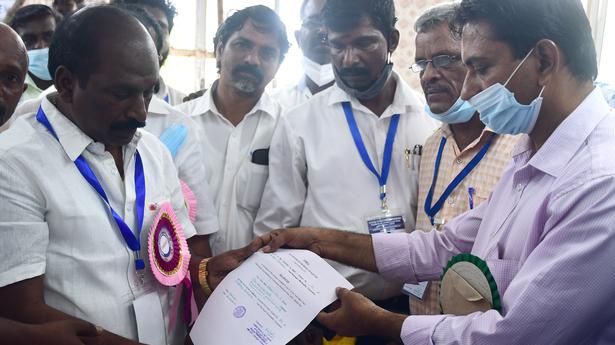
Former AIADMK MLA loses to DMK candidate in Ward 89 of Ambattur zone
The Hindu
‘Residents were angry over delay in infrastructure projects’
Former AIADMK MLA V. Alexander has lost to DMK candidate M.E. Sekar by a margin of 2,378 votes in the local bodies election in Ward 89 in Ambattur zone.
While the DMK candidate secured 5,091 votes, the AIADMK candidate bagged 2,713. The BJP candidate came third, winning 775 votes.
A representative of a residents’ association said many residents voted for the DMK candidate due to the delay in the implementation of various civic infrastructure projects over the last few years. “The residents demanded metro rail connectivity in Ward 89 in Ambattur zone. They wanted at least mini bus services to the existing metro stations. But this didn’t materialise. So, they were angry,” the residents’ representative said.
The locals have also been demanding more parks in the ward. “During the Vardah and Gaja cyclones, though the DMK candidate was not holding any elected post, he was involved in clearing fallen trees with men and machinery at his own expense. Similarly, during the recent rain, he was directly involved in clearing stagnant water and removing fallen trees. That gave the local residents’ welfare associations the confidence that he can deliver if elected, and they have supported him,” the residents’ representative said.
Mr. Sekar said he had promised that he will serve all the residents in the ward, including those who didn’t vote for him, as Chief Minister M.K. Stalin had advised the candidates to do so. “This is a victory for our Chief Minister’s welfare initiatives,” said the DMK candidate, who met the Chief Minister on Wednesday. Mr. Alexander said he would continue to work hard for the people of the ward, even after the defeat. “We worked hard. But the power of the DMK has prevented us from winning the election. We accept the verdict of the people,” he said.
“We have implemented road infrastructure projects and set up LED streetlights and stormwater drains at a cost of ₹25 crore. We constructed a gym at a cost of ₹50 lakh and a canal at a cost of ₹33 crore near Jeevan Beema Nagar,” Mr. Alexander said.





















 Run 3 Space | Play Space Running Game
Run 3 Space | Play Space Running Game Traffic Jam 3D | Online Racing Game
Traffic Jam 3D | Online Racing Game Duck Hunt | Play Old Classic Game
Duck Hunt | Play Old Classic Game











